- Home
- Truman Capote
In Cold Blood Page 3
In Cold Blood Read online
Page 3
Outside the drugstore, Perry stationed himself in the sun. It was a quarter to nine, and Dick was a half hour late; however, if Dick had not hammered home the every-minute importance of the next twenty-four hours, he would not have noticed it. Time rarely weighed upon him, for he had many methods of passing it—among them, mirror gazing. Dick had once observed, “Every time you see a mirror you go into a trance, like. Like you was looking at some gorgeous piece of butt. I mean, my God, don’t you ever get tired?” Far from it; his own face enthralled him. Each angle of it induced a different impression. It was a changeling’s face, and mirror-guided experiments had taught him how to ring the changes, how to look now ominous, now impish, now soulful; a tilt of the head, a twist of the lips, and the corrupt gypsy became the gentle romantic. His mother had been a full-blooded Cherokee; it was from her that he had inherited his coloring—the iodine skin, the dark, moist eyes, the black hair, which he kept brilliantined and was plentiful enough to provide him with sideburns and a slippery spray of bangs. His mother’s donation was apparent; that of his father, a freckled, ginger-haired Irishman, was less so. It was as though the Indian blood had routed every trace of the Celtic strain. Still, pink lips and a perky nose confirmed its presence, as did a quality of roguish animation, of uppity Irish egotism, which often activated the Cherokee mask and took control completely when he played the guitar and sang. Singing, and the thought of doing so in front of an audience, was another mesmeric way of whittling hours. He always used the same mental scenery—a night club in Las Vegas, which happened to be his home town. It was an elegant room filled with celebrities excitedly focused on the sensational new star rendering his famous, backed-by-violins version of “I’ll Be Seeing You” and encoring with his latest self-composed ballad:
Every April flights of parrots
Fly overhead, red and green,
Green and tangerine.
I see them fly, I hear them high,
Singing parrots bringing April spring . . .
(Dick, on first hearing this song, had commented, “Parrots don’t sing. Talk maybe. Holler. But they sure as hell don’t sing.” Of course, Dick was very literal-minded, very—he had no understanding of music, poetry—and yet when you got right down to it, Dick’s literalness, his pragmatic approach to every subject, was the primary reason Perry had been attracted to him, for it made Dick seem, compared to himself, so authentically tough, invulnerable, “totally masculine.”)
Nevertheless, pleasant as this Las Vegas reverie was, it paled beside another of his visions. Since childhood, for more than half his thirty-one years, he had been sending off for literature (“FORTUNES IN DIVING! Train at Home in Your Spare Time. Make Big Money Fast in Skin and Lung Diving. FREE BOOKLETS . . .”), answering advertisements (“SUNKEN TREASURE! Fifty Genuine Maps! Amazing Offer . . .”) that stoked a longing to realize an adventure his imagination swiftly and over and over enabled him to experience: the dream of drifting downward through strange waters, of plunging toward a green sea-dusk, sliding past the scaly, savage-eyed protectors of a ship’s hulk that loomed ahead, a Spanish galleon—a drowned cargo of diamonds and pearls, heaping caskets of gold.
A car horn honked. At last—Dick.
“Good grief, Kenyon! I hear you.”
As usual, the devil was in Kenyon. His shouts kept coming up the stairs: “Nancy! Telephone!”
Barefoot, pajama-clad, Nancy scampered down the stairs. There were two telephones in the house—one in the room her father used as an office, another in the kitchen. She picked up the kitchen extension: “Hello? Oh, yes, good morning, Mrs. Katz.”
And Mrs. Clarence Katz, the wife of a farmer who lived on the highway, said, “I told your daddy not to wake you up. I said Nancy must be tired after all that wonderful acting she did last night. You were lovely, dear. Those white ribbons in your hair! And that part when you thought Tom Sawyer was dead—you had real tears in your eyes. Good as anything on TV. But your daddy said it was time you got up; well, it is going on for nine. Now, what I wanted, dear—my little girl, my little Jolene, she’s just dying to bake a cherry pie, and seeing how you’re a champion cherry-pie maker, always winning prizes, I wondered could I bring her over there this morning and you show her?”
Normally, Nancy would willingly have taught Jolene to prepare an entire turkey dinner; she felt it her duty to be available when younger girls came to her wanting help with their cooking, their sewing, or their music lessons—or, as often happened, to confide. Where she found the time, and still managed to “practically run that big house” and be a straight-A student, the president of her class, a leader in the 4-H program and the Young Methodists League, a skilled rider, an excellent musician (piano, clarinet), an annual winner at the county fair (pastry, preserves, needlework, flower arrangement)—how a girl not yet seventeen could haul such a wagonload, and do so without “brag,” with, rather, merely a radiant jauntiness, was an enigma the community pondered, and solved by saying, “She’s got character. Gets it from her old man.” Certainly her strongest trait, the talent that gave support to all the others, derived from her father: a fine-honed sense of organization. Each moment was assigned; she knew precisely, at any hour, what she would be doing, how long it would require. And that was the trouble with today: she had overscheduled it. She had committed herself to helping another neighbor’s child, Roxie Lee Smith, with a trumpet solo that Roxie Lee planned to play at a school concert; had promised to run three complicated errands for her mother; and had arranged to attend a 4-H meeting in Garden City with her father. And then there was lunch to make and, after lunch, work to be done on the bridesmaids’ dresses for Beverly’s wedding, which she had designed and was sewing herself. As matters stood, there was no room for Jolene’s cherry-pie lesson. Unless something could be canceled.
“Mrs. Katz? Will you hold the line a moment, please?”
She walked the length of the house to her father’s office. The office, which had an outside entrance for ordinary visitors, was separated from the parlor by a sliding door; though Mr. Clutter occasionally shared the office with Gerald Van Vleet, a young man who assisted him with the management of the farm, it was fundamentally his retreat—an orderly sanctuary, paneled in walnut veneer, where, surrounded by weather barometers, rain charts, a pair of binoculars, he sat like a captain in his cabin, a navigator piloting River Valley’s sometimes risky passage through the seasons.
“Never mind,” he said, responding to Nancy’s problem. “Skip 4-H. I’ll take Kenyon instead.”
And so, lifting the office phone, Nancy told Mrs. Katz yes, fine, bring Jolene right on over. But she hung up with a frown. “It’s so peculiar,” she said as she looked around the room and saw in it her father helping Kenyon add a column of figures, and, at his desk by the window, Mr. Van Vleet, who had a kind of brooding, rugged good looks that led her to call him Heathcliff behind his back. “But I keep smelling cigarette smoke.”
“On your breath?” inquired Kenyon.
“No, funny one. Yours.”
That quieted him, for Kenyon, as he knew she knew, did once in a while sneak a puff—but, then, so did Nancy.
Mr. Clutter clapped his hands. “That’s all. This is an office.”
Now, upstairs, she changed into faded Levis and a green sweater, and fastened round her wrist her third-most-valued belonging, a gold watch; her closest cat friend, Evinrude, ranked above it, and surmounting even Evinrude was Bobby’s signet ring, the cumbersome proof of her “going-steady” status, which she wore (when she wore it; the least flare-up and off it came) on a thumb, for even with the use of adhesive tape its man-size girth could not be made to fit a more suitable finger. Nancy was a pretty girl, lean and boyishly agile, and the prettiest things about her were her short-bobbed, shining chestnut hair (brushed a hundred strokes each morning, the same number at night) and her soap-polished complexion, still faintly freckled and rose-brown from last summer’s sun. But it was her eyes, wide apart, darkly translucent, like ale held to the light,
that made her immediately likable, that at once announced her lack of suspicion, her considered and yet so easily triggered kindliness.
“Nancy!” Kenyon called. “Susan on the phone.”
Susan Kidwell, her confidante. Again she answered in the kitchen.
“Tell,” said Susan, who invariably launched a telephone session with this command. “And, to begin, tell why you were flirting with Jerry Roth.” Like Bobby, Jerry Roth was a school basketball star.
“Last night? Good grief, I wasn’t flirting. You mean because we were holding hands? He just came backstage during the show. And I was so nervous. So he held my hand. To give me courage.”
“Very sweet. Then what?”
“Bobby took me to the spook movie. And we held hands.”
“Was it scary? Not Bobby. The movie.”
“He didn’t think so; he just laughed. But you know me. Boo!—and I fall off the seat.”
“What are you eating?”
“Nothing.”
“I know—your fingernails,” said Susan, guessing correctly. Much as Nancy tried, she could not break the habit of nibbling her nails, and, whenever she was troubled, chewing them right to the quick. “Tell. Something wrong?”
“No. ”
“Nancy. C’est moi. . .” Susan was studying French.
“Well—Daddy. He’s been in an awful mood the last three weeks. Awful. At least, around me. And when I got home last night he started that again.”
“That” needed no amplification; it was a subject that the two friends had discussed completely, and upon which they agreed. Susan, summarizing the problem from Nancy’s viewpoint, had once said, “You love Bobby now, and you need him. But deep down even Bobby knows there isn’t any future in it. Later on, when we go off to Manhattan, everything will seem a new world.” Kansas State University is in Manhattan, and the two girls planned to enroll there as art students, and to room together. “Everything will change, whether you want it to or not. But you can’t change it now, living here in Holcomb, seeing Bobby every day, sitting in the same classes—and there’s no reason to. Because you and Bobby are a very happy thing. And it will be something happy to think back about—if you’re left alone. Can’t you make your father understand that?” No, she could not. “Because,” as she explained it to Susan, “whenever I start to say something, he looks at me as though I must not love him. Or as though I loved him less. And suddenly I’m tongue-tied; I just want to be his daughter and do as he wishes.” To this Susan had no reply; it embodied emotions, a relationship, beyond her experience. She lived alone with her mother, who taught music at the Holcomb School, and she did not remember her own father very clearly, for years ago, in their native California, Mr. Kidwell had one day left home and not come back.
“And, anyway,” Nancy continued now, “I’m not sure it’s me. That’s making him grouchy. Something else—he’s really worried about something.”
“Your mother?”
No other friend of Nancy’s would have presumed to make such a suggestion. Susan, however, was privileged. When she had first appeared in Holcomb, a melancholy, imaginative child, willowy and wan and sensitive, then eight, a year younger than Nancy, the Clutters had so ardently adopted her that the fatherless little girl from California soon came to seem a member of the family. For seven years the two friends had been inseparable, each, by virtue of the rarity of similar and equal sensibilities, irreplaceable to the other. But then, this past September, Susan had transferred from the local school to the vaster, supposedly superior one in Garden City. It was the usual procedure for Holcomb students who intended going on to college, but Mr. Clutter, a die-hard community booster, considered such defections an affront to community spirit; the Holcomb School was good enough for his children, and there they would remain. Thus, the girls were no longer always together, and Nancy deeply felt the daytime absence of her friend, the one person with whom she need be neither brave nor reticent.
“Well. But we’re all so happy about Mother—you heard the wonderful news.” Then Nancy said, “Listen,” and hesitated, as if summoning nerve to make an outrageous remark. “Why do I keep smelling smoke? Honestly, I think I’m losing my mind. I get into the car, I walk into a room, and it’s as though somebody had just been there, smoking a cigarette. It isn’t Mother, it can’t be Kenyon. Kenyon wouldn’t dare . . .”
Nor, very likely, would any visitor to the Clutter home, which was pointedly devoid of ashtrays. Slowly, Susan grasped the implication, but it was ludicrous. Regardless of what his private anxieties might be, she could not believe that Mr. Clutter was finding secret solace in tobacco. Before she could ask if this was really what Nancy meant, Nancy cut her off: “Sorry, Susie. I’ve got to go. Mrs. Katz is here.”
Dick was driving a black 1949 Chevrolet sedan. As Perry got in, he checked the back seat to see if his guitar was safely there; the previous night, after playing for a party of Dick’s friends, he had forgotten and left it in the car. It was an old Gibson guitar, sandpapered and waxed to a honey-yellow finish. Another sort of instrument lay beside it—a twelve-gauge pump-action shotgun, brand-new, blue-barreled, and with a sportsman’s scene of pheasants in flight etched along the stock. A flashlight, a fishing knife, a pair of leather gloves, and a hunting vest fully packed with shells contributed further atmosphere to this curious still life.
“You wearing that?” Perry asked, indicating the vest.
Dick rapped his knuckles against the windshield. “Knock, knock. Excuse me, sir. We’ve been out hunting and lost our way. If we could use the phone. . . ”
“Si, señor. Yo comprendo.”
“A cinch,” said Dick. “I promise you, honey, we’ll blast hair all over them walls.”
“ ‘Those’ walls,” said Perry. A dictionary buff, a devotee of obscure words, he had been intent on improving his companion’s grammar and expanding his vocabulary ever since they had celled together at Kansas State Penitentiary. Far from resenting these lessons, the pupil, to please his tutor, once composed a sheaf of poems, and though the verses were very obscene, Perry, who thought them nevertheless hilarious, had had the manuscript leather-bound in a prison shop and its title, Dirty Jokes, stamped in gold.
Dick was wearing a blue jumper suit; lettering stitched across the back of it advertised BOB SANDS’ BODY SHOP. He and Perry drove along the main street of Olathe until they arrived at the Bob Sands establishment, an auto-repair garage, where Dick had been employed since his release from the penitentiary in mid-August. A capable mechanic, he earned sixty dollars a week. He deserved no salary for the work he planned to do this morning, but Mr. Sands, who left him in charge on Saturdays, would never know he had paid his hireling to overhaul his own car. With Perry assisting him, he went to work. They changed the oil, adjusted the clutch, recharged the battery, replaced a throw-out bearing, and put new tires on the rear wheels—all necessary undertakings, for between today and tomorrow the aged Chevrolet was expected to perform punishing feats.
“Because the old man was around,” said Dick, answering Perry, who wanted to know why he had been late in meeting him at the Little Jewel. “I didn’t want him to see me taking the gun out of the house. Christ, then he would have knowed I wasn’t telling the truth.”
“ ‘Known.’ But what did you say? Finally?”
“Like we said. I said we’d be gone overnight—said we was going to visit your sister in Fort Scott. On account of she was holding money for you. Fifteen hundred dollars.” Perry had a sister, and had once had two, but the surviving one did not live in Fort Scott, a Kansas town eighty-five miles from Olathe; in fact, he was uncertain of her present address.
“And was he sore?”
“Why should he be sore?”
“Because he hates me,” said Perry, whose voice was both gentle and prim—a voice that, though soft, manufactured each word exactly, ejected it like a smoke ring issuing from a parson’s mouth. “So does your mother. I could see—the ineffable way they looked at me.”
Dick shrugged. “Nothing to do with you. As such. It’s just they don’t like me seeing anybody from The Walls.” Twice married, twice divorced, now twenty-eight and the father of three boys, Dick had received his parole on the condition that he reside with his parents; the family, which included a younger brother, lived on a small farm near Olathe. “Anybody wearing the fraternity pin,” he added, and touched a blue dot tattooed under his left eye—an insigne, a visible password, by which certain former prison inmates could identify him.
“I understand,” said Perry. “I sympathize with that. They’re good people. She’s a real sweet person, your mother.”
Dick nodded; he thought so, too.

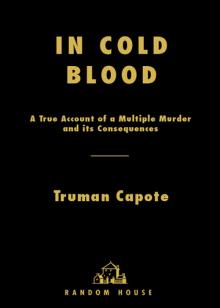 In Cold Blood
In Cold Blood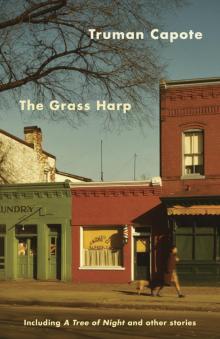 The Grass Harp, Including a Tree of Night and Other Stories
The Grass Harp, Including a Tree of Night and Other Stories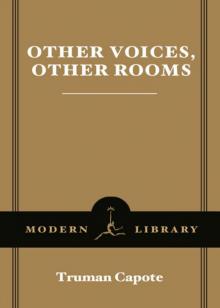 Other Voices, Other Rooms
Other Voices, Other Rooms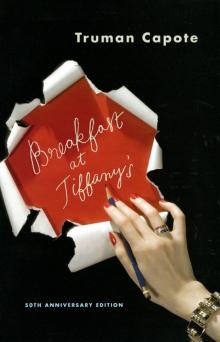 Breakfast at Tiffany's
Breakfast at Tiffany's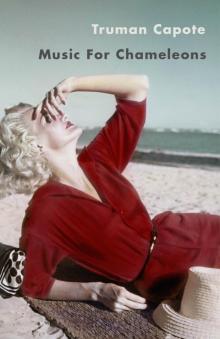 Music For Chameleons
Music For Chameleons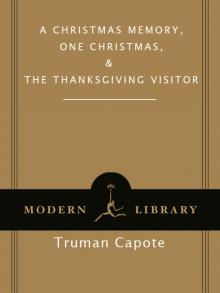 A Christmas Memory, Including One Christmas and the Thanksgiving Visitor
A Christmas Memory, Including One Christmas and the Thanksgiving Visitor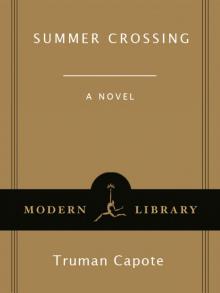 Summer Crossing
Summer Crossing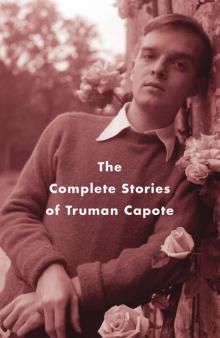 The Complete Stories of Truman Capote
The Complete Stories of Truman Capote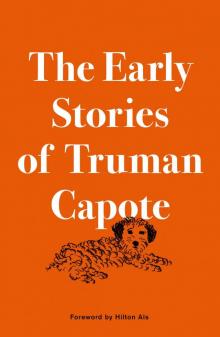 The Early Stories of Truman Capote
The Early Stories of Truman Capote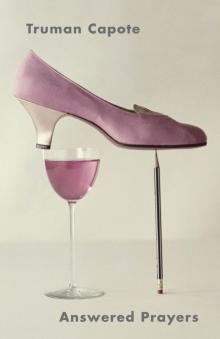 Answered Prayers
Answered Prayers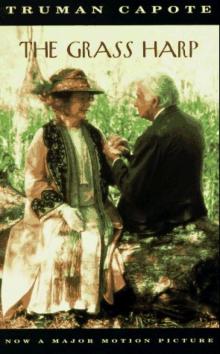 The Grass Harp
The Grass Harp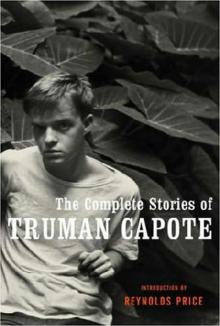 SSC (2004) The Complete Stories of Truman Capote
SSC (2004) The Complete Stories of Truman Capote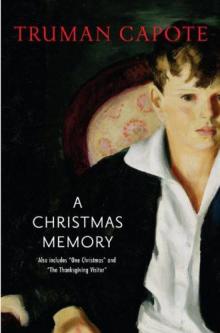 A Christmas Memory
A Christmas Memory